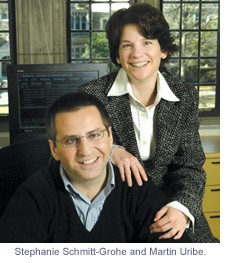New Hires Expand Economics' International Profile
Husband-wife team bring complementary strengths to department

Since 1989, when Stephanie Schmitt-Grohe and Martn Uribe met in a doctoral student study group at the University of Chicago, they have hardly left each other's side.
At Chicago, they worked as research assistants for the same economics professor. They then took jobs at the Board of Governors of the Federal Reserve System; she worked in the monetary affairs office on the second floor, he in the international finance division on the first.
And in summer 2003, the married economics professors landed together at Duke -- in adjacent offices on the second floor of the Social Sciences building.
"We are in the same field," Schmitt-Grohe said. "We write many of our papers together. It's very unusual that an economics department has two slots for people who have the same specialty."
But this year, Duke did, and economics chairman Thomas Nechyba is thrilled to have landed two "rising stars." Duke had tried to lure Schmitt-Grohe and Uribe in 1998, but this time Duke called at the right time.
Schmitt-Grohe had been working as an associate economics professor at Rutgers and Uribe as an assistant professor at the University of Pennsylvania. They lived within walking distance of Penn because Uribe, who has degenerative myopia, does not drive. Schmitt-Grohe had an office at Penn, but still had to commute regularly to Rutgers -- almost 70 miles away -- for classes.
After five years of this arrangement, they were ready to work in the same place.
"Stephanie and Martn are rising stars in the fields of macroeconomics and international finance," Nechyba said. "Combined with existing strengths across the university, they are helping in our efforts to lift Duke's international profile in those areas to new levels.
"Much of their research overlaps in a collaboration that appears to be as fruitful professionally as it is personally," he added. "However, each brings their unique perspectives -- Martn with a particular interest in issues arising in Latin American and other developing contexts, and Stephanie with a special interest in the profession's renewed direction of bringing sound theoretical models to bear on real-world issues of importance."
Schmitt-Grohe's research is in monetary and fiscal policy design, with a current project in inflation stabilization. She began her formal economics education at a university in Germany and then earned her master's degree in business administration at Baruch College of The City University of New York.
Schmitt-Grohe is a research associate at the National Bureau of Economic Research and a research affiliate at the Centre for Economic Policy Research in London. She has held visiting positions at the European Central Bank, Goethe University in Frankfurt, and Princeton University. She is an editorial board member of the Journal of Macroeconomics.
This semester, she is teaching an intermediate macroeconomics course.
Uribe is a specialist in international finance whose research aims at understanding business cycles and financial crises in emerging countries. Currently, he is studying the effects of the U.S. interest rate on business conditions in emerging economies.
He earned his bachelor's degree from Universidad Nacional de C´ordoba in Argentina, and his master's from Centro de Estudios Macroecon´omicos de Argentina
in Buenos Aires. He has been a faculty research fellow at the National Bureau of Economic Research since May 2002 and has served as a visiting fellow at Princeton.
Uribe also serves as associate editor of the Journal of International Economics and the Journal of Money, Credit, and Banking. He teaches undergraduate and graduate students in international monetary theory and international finance.
Both Schmitt-Grohe and Uribe have been fascinated with economics since childhood. At home, they are teaching their two sons a love of language.
Schmitt-Grohe was born and raised in Germany, and always thought she would return there after studying in the United States. Uribe is from Argentina, still visits home four or fives times a year, and is fluent in Spanish.
Their native languages pose something of a challenge in family conversations. Their kids are fluent in German, Spanish and English. But Schmitt-Grohe only has limited Spanish skills and Uribe has limited German skills, though Uribe admits that his wife's language skills are far better than his own.
Sometimes Schmitt-Grohe doesn't understand Uribe when he is talking to their children, and vice versa.
"We try to be very consistent in talking to our kids in our languages," Uribe said. "They absorb it very well. The kids are completely ahead of me."
What's more, their kids have been exposed to an English-speaking nanny and a Portugese-speaking housekeeper. Uribe said that his older son grew so accustomed to hearing every person speak a different language, he once thought he needed to invent one of his own. "He started learning that not every person had a language," he said.
Even in their non-work moments, Schmitt-Grohe and Uribe find themselves debating and thinking about economics. Such impromptu discussions, inspired by stories on National Public Radio or other media outlets, often lead to research papers.
But such discussions don't happen quite as often anymore.
"Now that we have kids, it's not so much," Schmitt-Grohe said. "I don't want to put my kids through that."